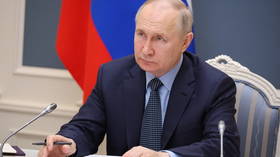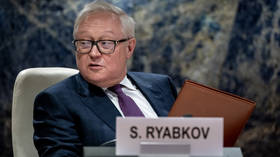Putin finalizes withdrawal from landmark arms control deal

Russian President Vladimir Putin signed a law on Monday that officially terminates the Treaty on Conventional Armed Forces in Europe (CFE). The Kremlin explained that the document had not been in force for years.
The 1990 agreement, which was signed by NATO and Soviet bloc members, including those that later joined the US-led military bloc, put limits on the number of tanks, armored vehicles, artillery, helicopters, and aircraft stationed in Europe as a way of establishing the military balance on the continent.
Commenting on the withdrawal, which was earlier approved by Russian MPs, Kremlin Press Secretary Dmitry Peskov said that the move would not have any “direct ramifications.”
“It was an already dead mechanism… and not through the fault of Russia,” the spokesman added. “In this case, Russia simply brought the situation to de facto [reality].”
However, Peskov went on to point out “an emerging large vacuum” in arms control and strategic stability architecture. In theory, those gaps “need to be urgently filled with new acts of international law that would regulate this situation,” he said, adding that such an outcome would suit the interests of the entire global community.
“However, for this to happen, you need to have working bilateral relations with a number of states that we currently do not have, for which we are also not at fault,” Peskov stressed, arguing that any future major arms control deals should be based on “very intensive and protracted work.”
Questions about the fate of the CFE arose even before the current standoff between Russia and the West over Ukraine. In 2007, Moscow suspended its participation in the treaty, citing the failure of the new NATO members to comply with the restrictions stipulated in the agreement.
In 2015, Russia withdrew from the CFE mechanisms, with Foreign Minister Sergey Lavrov arguing a year earlier that “no NATO member is adhering to the treaty, and we don’t want to look like we are taking part in the theater of the absurd.”













